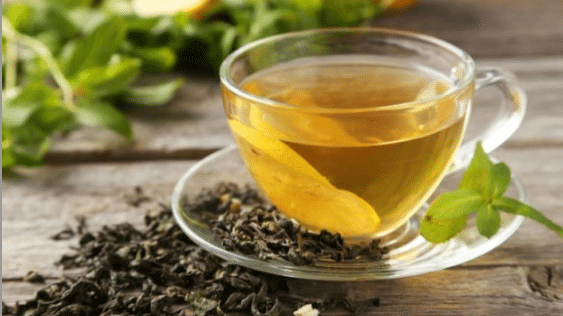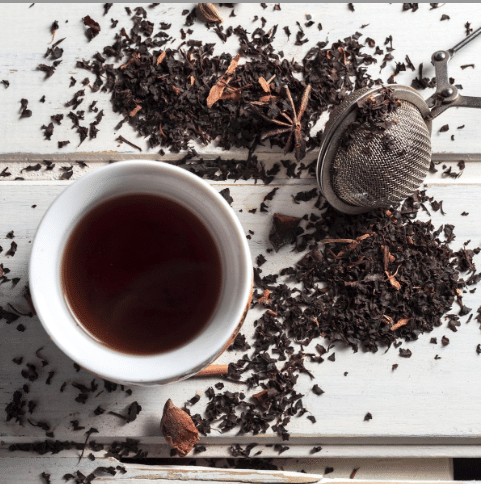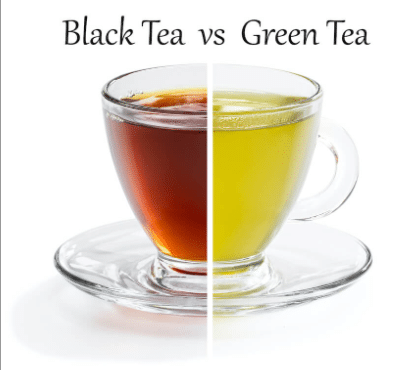In this article today ‘Green Tea Vs Black Tea Health Benefits’, we will be comparing the health benefits of green and black tea to discover which one is healthier so that you can which among them is the best tea for you.
Because both green tea and black tea are considered to be healthy options, have you ever wondered which one is better for you? If yes, then read on.
Drinking Tea as a Whole

Many times, when we are stressed, sleepy, anxious, or confused, a cup of tea comes in handy to relax and fix our moods. After all, it is not possible to be energetic all the time—it’s OK to feel tired or lazy. This is why a cup of tea is the magic drink to boost your energy.
Tea not only refreshes you, but it also changes your mood. When it comes to tea, those on a path to fitness usually prefer black tea or green tea. Both the teas come from a plant called Camellia Sinensis.
The harvesters pull out the uppermost bloom and leaves of the plant. Then these leaves either turn black or green, depending on how they are prepared.
But have you wondered, which of the teas is healthier? Is green tea the only weight-loss-friendly tea out there? Does the black variety pack as many antioxidants as green tea?
Today, that is why we have this article today; ‘Green Tea Vs Black Tea Health Benefits’ in which we will pit both these teas against each other to help choose the best beverage for yourself.
Green Tea Vs Black Tea Health Benefits

Green Tea – The Elixir of Antioxidants
Green tea stands out as a true elixir of antioxidants. Packed with polyphenols, particularly catechins, it possesses extraordinary free-radical-fighting capabilities. These antioxidants help combat oxidative stress, reduce the risk of chronic diseases, and promote overall well-being.[mfn]https://www.healthline.com/nutrition/green-tea-vs-black-tea#bottom-line[/mfn]
What Benefits Does Green Tea Have?
- Weight Management and Metabolism: For those on a quest for a healthier lifestyle, green tea is a steadfast ally. It’s renowned for its ability to boost metabolism and support weight management. The secret lies in its natural compounds that enhance fat oxidation and contribute to sustainable weight loss.
- Heart Health Guardian: The heart is at the core of our well-being, and green tea does its part to protect it. Regular consumption has been linked to reduced levels of bad cholesterol, improved cardiovascular health, and a decreased risk of heart disease. It’s like a shield for your most vital organ.
- Brain Boosting Brew: Green tea isn’t just a treat for the body; it’s a treat for the mind as well. The combination of L-theanine and caffeine provides a gentle, sustained energy boost without the jittery side effects. This unique synergy enhances cognitive function, promotes mental clarity, and reduces stress.
- Cancer Prevention Potential: The catechins in green tea have demonstrated their potential in cancer prevention. While it’s not a magic cure, it’s a natural ally in the battle against various forms of cancer. Its anti-inflammatory properties also support the body’s defense mechanisms.
- Radiant Skin and Aging Gracefully: Green tea’s antioxidant-rich profile helps keep your skin radiant and youthful. It fights premature aging, helps with acne control, and offers protection against UV damage, making it a beauty secret of many.
Black Tea – A Robust Elixir for Wellness

In the age-old battle of teas, Black Tea emerges as a formidable contender, offering a plethora of health benefits that make it a compelling choice for tea enthusiasts and health-conscious individuals.
With its rich history and an impressive array of advantages, Black Tea stands as a tireless champion in the world of wellness.
What are the Benefits of Black Tea?
- Antioxidant Powerhouse: Black Tea is teeming with antioxidants, specifically polyphenols, and catechins, which combat oxidative stress and protect your cells from damage. These antioxidants promote overall well-being and contribute to a healthier, more resilient you.
- Heart Health Guardian: Your heart deserves the best, and Black Tea delivers. Regular consumption has been linked to lower levels of bad cholesterol and a reduced risk of cardiovascular diseases. By supporting heart health, Black Tea helps you savor life to the fullest.
- Cognitive Clarity: Sharpen your mind with every sip of Black Tea. It contains caffeine and L-theanine, a dynamic duo that fosters alertness and focus, without the jitters often associated with other caffeinated beverages.
- Immune Boosting Brew: Strengthen your immune system with the assistance of Black Tea. The abundance of antioxidants bolsters your body’s natural defenses, helping you ward off illnesses and stay resilient year-round.
- Digestive Harmony: Black Tea aids in digestion and eases digestive discomfort. Enjoy a cup after a meal to soothe your stomach and keep digestive issues at bay.
- Stress Relief, Naturally: Life can be stressful, but Black Tea can be your refuge. It promotes relaxation and helps reduce stress, making it an ideal choice for winding down after a long day.
- Robust Flavor, Endless Varieties: From bold and malty to delicate and floral, Black Tea offers a wide spectrum of flavors and styles. Whether you prefer Darjeeling, Earl Grey, or English Breakfast, you’ll find a Black Tea that suits your taste buds.
Green Tea Vs Black Tea Health Benefits: So, Which One is Healthier?

Green tea and black tea have similar health benefits, like boosting alertness and protecting heart health. While both are high in antioxidants, there are some differences in their components.
Tea is beloved by people all over the world. Both green and black tea are made from the leaves of the Camellia sinensis plant. The key difference between the two is that black tea is oxidized and green tea is not.
For producing black tea, leaves are plucked and withered and then crumbled, curled, cracked, or curved, and left to oxidize before they are dehydrated. As the enzymes in the leaves go through oxidation, the finished leaves appear darker and brownish in color while they get a stronger essence, flavor, and aroma.
On the other hand, green tea is processed to prevent oxidation and is thus much lighter in color than black tea. To make green tea, the leaves are collected, dried up, and then warmed through pan frying or steaming right away after being plucked. This prevents the leaves from oxidizing, which ensures their flavor and color are fresh.
So while black tea is fermented and oxidized, green tea leaves are completely natural.
To learn more about green and black tea, you can watch the video below:
Shared Benefits of Green and Black Tea
While green and black tea differ, they may provide some of the same health benefits:
- Can Protect Your Heart
Both green and black tea are rich in a group of protective antioxidants called polyphenols. Specifically, they contain flavonoids, a subgroup of polyphenols.
However, the type and amount of flavonoids they contain differ. For example, green tea contains a much higher amount of epigallocatechin-3-gallate (EGCG), whereas black tea is a rich source of theaflavins.
The flavonoids in green and black tea are thought to protect your heart. One animal study found that green and black tea were equally effective at preventing blood vessel plaque formation by 26% at the lowest dose and up to 68% at the highest dose.
The study also found that both types of tea helped reduce LDL (bad) cholesterol and triglycerides. What’s more, two reviews examining over 10 quality studies each found that drinking green and black tea can lower your blood pressure.
Furthermore, another review of green tea studies found that people who drank 1–3 cups per day had a 19% and 36% reduced risk of heart attack and stroke respectively, compared with those who had less than 1 cup of green tea each day.
Similarly, drinking at least 3 cups of black tea could reduce your risk of heart disease by 11%.
- May Boost Brain Function
Green and black tea both contain caffeine, a known stimulant. Green tea contains less caffeine than black tea — about 35 mg per 8-ounce (230-ml) cup, compared with 39–109 mg for the same serving of black tea.
Caffeine stimulates your nervous system by blocking the inhibitory neurotransmitter adenosine. It also aids the release of mood-enhancing neurotransmitters like dopamine and serotonin.
As a result, caffeine can boost alertness, mood, vigilance, reaction time, and short-term recall. Green and black teas also contain the amino acid L-theanine, which is not present in coffee.
L-theanine is thought to cross the blood-brain barrier and trigger the release of an inhibitory neurotransmitter in the brain called gamma-aminobutyric acid (GABA), which brings about a relaxed but alert state.
At the same time, it promotes the release of the mood-enhancing hormones dopamine and serotonin. L-theanine is thought to balance the effects of caffeine.
The combination of these two substances may even be synergistic, as one study found that people who ingested L-theanine and caffeine together had better attention than when either was used alone.
In general, there is slightly more L-theanine in green tea than in black tea, though the amounts can vary considerably. Both green and black tea are great alternatives to coffee for those who want a mood lift without coffee’s telltale restlessness.
Green and black tea contain polyphenols that have strong antioxidant effects, potentially reducing your risk of heart disease. Also, they both have caffeine to increase alertness and focus and L-theanine, which releases stress and calms your body.
So, the Difference?
- Green Tea is Rich in the Powerful Antioxidant EGCG
Green tea is an excellent source of the potent antioxidant epigallocatechin-3-gallate (EGCG). Though green tea contains other polyphenols, such as catechin and gallic acid, EGCG is considered to be the most powerful and likely responsible for many of green tea’s health benefits.
Here’s a list of the possible benefits of the EGCG in green tea:
- Cancer: Test-tube studies have found that the EGCG in green tea can inhibit the multiplication of cancer cells and cause cancer cell death.
- Alzheimer’s disease: EGCG may reduce the harmful effects of amyloid plaques, which accumulate in Alzheimer’s patients.
- Anti-fatigue: A study found that mice consuming an EGCG-containing drink had prolonged swimming times before exhaustion, compared with those drinking water.
- Liver protection: EGCG has been shown to reduce the development of fatty liver in mice on a high-fat diet.
- Anti-microbial: This antioxidant can cause damage to bacterial cell walls and may even reduce the transmission of some viruses.
- Calming: It may interact with receptors in your brain to exert a calming effect on your body.
Though most of the research on the EGCG in green tea has been carried out in test-tube or animal studies, the findings lend credibility to the long-reported benefits of drinking green tea.
In summary, Green tea contains EGCG, an antioxidant that test-tube and animal studies have demonstrated can fight cancer and bacterial cells and protect your brain and liver.
- Green Tea Has Less Caffeine
Yes, green tea has less caffeine content than black tea, but this also depends on the plant, preparation, and infusing methods. A cup of green tea has one-fourth the quantity of caffeine as compared to a cup of coffee, while black tea has one-third the caffeine content.
While
- Black Tea Contains Beneficial Theaflavins
Theaflavins are a group of polyphenols that are unique to black tea. They’re formed during the oxidation process and represent 3–6% of all polyphenols in black tea.
Theaflavins seem to offer many health benefits — all related to their antioxidant ability. These polyphenols can protect fat cells from damage by free radicals and may support your body’s natural antioxidant production. What’s more, they may protect your heart and blood vessels.
One animal study found that theaflavins can lower the risk of plaque formation in blood vessels by reducing inflammation and increasing the availability of nitric oxide, which helps your blood vessels dilate.[mfn]https://www.mindbodygreen.com/articles/green-tea-vs-black-tea[/mfn]
In addition, theaflavins have been shown to significantly reduce cholesterol and blood sugar levels. They may even promote fat breakdown and have been recommended as a potential aid for obesity management.
In fact, the theaflavins in black tea may have the same antioxidant capacity as polyphenols in green tea. Theaflavins are unique to black tea. Through their antioxidant effects, they may improve blood vessel function and support fat loss.
- Black Tea Has More Caffeine
Caffeine stimulates the nervous system by obstructing inhibitory neurotransmitters adenosine. This refreshes the mood, which is why black tea is more effective in increasing reaction time and alertness
So, Which Do You Choose?
Green and black tea offer similar benefits. While they differ in their polyphenol composition, they may bestow the same beneficial effects on blood vessel function.
Most research indicates that green tea has stronger antioxidant properties than black tea, but one study found that green and black teas exhibited equally effective antioxidant capacities.[mfn]https://www.healthshots.com/healthy-eating/nutrition/green-tea-vs-black-tea-here-is-whats-healthier/[/mfn]
Though both contain caffeine, black tea usually has more — making green the better choice for people sensitive to this stimulant. Furthermore, green tea contains more L-theanine, an amino acid that’s calming and can balance the effects of caffeine.
However, if you’re looking for a caffeine boost that is not as strong as coffee, black tea could be a great option for you. Keep in mind that both black and green tea contain tannins, which can bind to minerals and reduce their absorption capacity. Therefore, tea may be best consumed between meals.
To summarize, green tea may have a slightly better antioxidant profile than black tea, but black tea is best if you want a powerful caffeine buzz.
The Bottom Line
Green and black tea provide similar health benefits, including for your heart and brain. While green tea may contain more powerful antioxidants, the evidence does not strongly favor one tea over the other.
Both contain the stimulant caffeine and L-theanine, which has a calming effect. In short, both are great additions to your diet.
[bwla_faq faq_topics=”frequently-asked-questions-on-green-tea-vs-black-tea” sbox=”1″ paginate=”1″ pag_limit=”5″ list=”1″ /]

